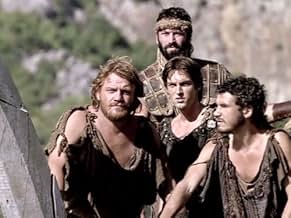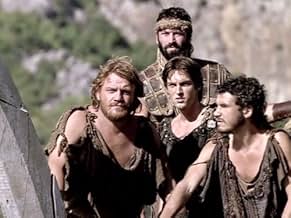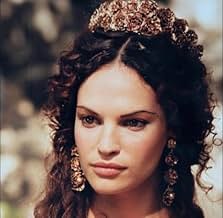IMDb RATING
6.0/10
5.9K
YOUR RATING
One of the most legendary adventures in all mythology is brought to life in an epic saga of one man's quest for the Golden Fleece, a gift from the gods.One of the most legendary adventures in all mythology is brought to life in an epic saga of one man's quest for the Golden Fleece, a gift from the gods.One of the most legendary adventures in all mythology is brought to life in an epic saga of one man's quest for the Golden Fleece, a gift from the gods.
- Nominated for 2 Primetime Emmys
- 10 nominations total
Browse episodes
Featured reviews
The criterion "sense of wonder" is commonly applied to sci-fi works, but is even more relevant to the fantasy genre. When the reader or viewer is touched by feelings of awe and mystery, they feel "moved" and have a deeper, more positive reaction to the artwork being witnessed.
The Harryhausen film was much more successful at this: the Bernard Herrmann score was masterful, and certain scenes portraying the interaction of gods and human beings (such as in the temple of Hera, the transformation of Hermes, the awakening of Talos) conveyed the deep reverence and awe that Bronze Age Greeks must have felt towards their gods. This newer Hallmark version conveys an attitude towards the Greek gods closer to mockery and amusement, perhaps appropriate for the "sophisticated" Athens in the age of Euripides or Aristophanes, but certainly out of touch with the period over a thousand years earlier when Jason lived.
The Harryhausen film was much more successful at this: the Bernard Herrmann score was masterful, and certain scenes portraying the interaction of gods and human beings (such as in the temple of Hera, the transformation of Hermes, the awakening of Talos) conveyed the deep reverence and awe that Bronze Age Greeks must have felt towards their gods. This newer Hallmark version conveys an attitude towards the Greek gods closer to mockery and amusement, perhaps appropriate for the "sophisticated" Athens in the age of Euripides or Aristophanes, but certainly out of touch with the period over a thousand years earlier when Jason lived.
The mini-series is not dead as some had proclaimed. This retelling of Jason's epic journey to gain the Golden Fleece has an excellent cast and impressive FX.
Jason London is impressive as the young hero, giving this actor a long-overdue chance to shine as a new star in the heavens over Olympus. His character is the center and the anchor of the sprawling story, and he gives a strong yet appealingly vulnerable quality to his character who happens to have the same name.
Though it was odd that Poseidon looked like a bunch of rocks with legs instead of the more-common image of him as a crowned merman with trident, most of the other magical or divine elements in the story were well-acted and believably realized through the computerized FX.
This TV mini-series is a worthy successor to the 1963 film.
Jason London is impressive as the young hero, giving this actor a long-overdue chance to shine as a new star in the heavens over Olympus. His character is the center and the anchor of the sprawling story, and he gives a strong yet appealingly vulnerable quality to his character who happens to have the same name.
Though it was odd that Poseidon looked like a bunch of rocks with legs instead of the more-common image of him as a crowned merman with trident, most of the other magical or divine elements in the story were well-acted and believably realized through the computerized FX.
This TV mini-series is a worthy successor to the 1963 film.
Being an unconditional admirer of Ray Harryhausen's and Don Chaffey's version of "Jason and the Argonauts" could be a disadvantage to fully enjoy this Hallmark mini-series. But surprisingly, it has its own values to make it an enjoyable experience.
First I'd like to claim that I see no reason to diminish its merits because of its faithfulness or liberties regarding Greek mythology. This is cinema not literature, and it must be evaluated as a work of moving images. If judging a cinematic work according to literary precepts were the rule, then not even the 1963 film would endure this kind of judgment: as I remember, Medea, for instance, was described as a high priestess not related to the royal family of Colchis. According to the faithful-to-literary-source approach, that would be enough to condemn the motion picture. On the other hand, I believe that "Jason 2000" was also inspired by cinematic tradition, not only by the 1963 production but by other sources as well, as Marcel Camus' "Orfeu negro", and today's horror films. It was also inspired by our times: the reason to include a female Argonaut validates the role of women warriors, instead of being a feminist or 'politically correct' concession.
One of the most interesting things about this version is its casting, resulting in the fact that the story is told from the point of view of young people, with all their impetus and naïveté. When most contemporary motion pictures portray aimless young persons, this series shows a purposeful group of young people with a mission who fulfill their destiny with passion. Such is the case of Jason, Medea, Acastus, Atalanta, Aspyrtes, Orpheus, Zetes, and most of the Argonauts. These are the real protagonists of the story. In their search for justice and love, they are helped or betrayed by their elders, be it gods (Zeus, Poseidon, and Hera who appears three times as an old peasant woman) or humans (Pelias, Aertes, Phineas).
It is inevitable to compare the film to its predecessor: concerning the gods, this time they seem more lustful and primitive than the Olympus portrayed in the 1963 film, with Nial McGinnis and Honor Blackman fighting over Jason's destiny. This time Hera and Zeus feel unequivocal sexual attraction towards Jason and Medea, respectively. Hera makes reference to Zeus' frolicking with humans, and that may please the Greek mythology purists. But their representations seem out of a detergent TV spot -clouds included- and the acting by Olivia Williams and, specially, by Angus MacFadyen do not help much. At least, in the original the ingenuousness of the gods seemed more apt to the story being told, than these two creatures who open the narration in awe, but close it with embarrassingly sexy foreplay.
Special effects are fine, but in some respects they do not surpass the Harryhausen creatures. A mechanic bull (with sound effects included) substitutes Talos, but the titan is evoked by the imposing height of a Poseidon out of "The Neverending Story". The sequences of the dragon, the skeleton army, and the harpies do not improve on the original ones. Compared to the seven-headed hydra, this dragon is rather clumsy (it falls awkwardly into a precipice that it has previously climbed with ease). The skeletons (this time looking like mannequins grounded on soil) lack the grace of the mean originals. In spite of the work of the Jim Henson workshop, the whole harpies sequence lacks the dark and exciting atmosphere created by Harryhausen, Chaffey and Herrmann.
In this version, there are more exciting warring scenes and Jason finally claims his throne, but to make the story work for three hours the film is full of melodramatic gestures and dialogues, which alternate with the action. The writers added basic "character development" with Freudian overtones that give a little depth to the personages: it may work for Pelias, Polymele or Medea, but in the case of Jason, being an action hero, his uncertainty and doubts tend to diminish the empathy with the viewer. In other occasions, they are too tame or just do not make sense: did Aspyrtes have an incestuous relationship with Medea, or is he gay and jealous of Medea because of Jason? In this respect, the direction of actors is very suggestive in several scenes.
All this said, I think that the film has the same enthusiasm of the original; the search for the golden fleece is still fascinating no matter how much Greek mythology has been altered. In the final analysis, "Jason 2000" is an enjoyable mini-series, with a story of tyranny, greed, and righteousness still relevant for our times.
First I'd like to claim that I see no reason to diminish its merits because of its faithfulness or liberties regarding Greek mythology. This is cinema not literature, and it must be evaluated as a work of moving images. If judging a cinematic work according to literary precepts were the rule, then not even the 1963 film would endure this kind of judgment: as I remember, Medea, for instance, was described as a high priestess not related to the royal family of Colchis. According to the faithful-to-literary-source approach, that would be enough to condemn the motion picture. On the other hand, I believe that "Jason 2000" was also inspired by cinematic tradition, not only by the 1963 production but by other sources as well, as Marcel Camus' "Orfeu negro", and today's horror films. It was also inspired by our times: the reason to include a female Argonaut validates the role of women warriors, instead of being a feminist or 'politically correct' concession.
One of the most interesting things about this version is its casting, resulting in the fact that the story is told from the point of view of young people, with all their impetus and naïveté. When most contemporary motion pictures portray aimless young persons, this series shows a purposeful group of young people with a mission who fulfill their destiny with passion. Such is the case of Jason, Medea, Acastus, Atalanta, Aspyrtes, Orpheus, Zetes, and most of the Argonauts. These are the real protagonists of the story. In their search for justice and love, they are helped or betrayed by their elders, be it gods (Zeus, Poseidon, and Hera who appears three times as an old peasant woman) or humans (Pelias, Aertes, Phineas).
It is inevitable to compare the film to its predecessor: concerning the gods, this time they seem more lustful and primitive than the Olympus portrayed in the 1963 film, with Nial McGinnis and Honor Blackman fighting over Jason's destiny. This time Hera and Zeus feel unequivocal sexual attraction towards Jason and Medea, respectively. Hera makes reference to Zeus' frolicking with humans, and that may please the Greek mythology purists. But their representations seem out of a detergent TV spot -clouds included- and the acting by Olivia Williams and, specially, by Angus MacFadyen do not help much. At least, in the original the ingenuousness of the gods seemed more apt to the story being told, than these two creatures who open the narration in awe, but close it with embarrassingly sexy foreplay.
Special effects are fine, but in some respects they do not surpass the Harryhausen creatures. A mechanic bull (with sound effects included) substitutes Talos, but the titan is evoked by the imposing height of a Poseidon out of "The Neverending Story". The sequences of the dragon, the skeleton army, and the harpies do not improve on the original ones. Compared to the seven-headed hydra, this dragon is rather clumsy (it falls awkwardly into a precipice that it has previously climbed with ease). The skeletons (this time looking like mannequins grounded on soil) lack the grace of the mean originals. In spite of the work of the Jim Henson workshop, the whole harpies sequence lacks the dark and exciting atmosphere created by Harryhausen, Chaffey and Herrmann.
In this version, there are more exciting warring scenes and Jason finally claims his throne, but to make the story work for three hours the film is full of melodramatic gestures and dialogues, which alternate with the action. The writers added basic "character development" with Freudian overtones that give a little depth to the personages: it may work for Pelias, Polymele or Medea, but in the case of Jason, being an action hero, his uncertainty and doubts tend to diminish the empathy with the viewer. In other occasions, they are too tame or just do not make sense: did Aspyrtes have an incestuous relationship with Medea, or is he gay and jealous of Medea because of Jason? In this respect, the direction of actors is very suggestive in several scenes.
All this said, I think that the film has the same enthusiasm of the original; the search for the golden fleece is still fascinating no matter how much Greek mythology has been altered. In the final analysis, "Jason 2000" is an enjoyable mini-series, with a story of tyranny, greed, and righteousness still relevant for our times.
It's a good indication of just how bad television is becoming when one spends four hours watching such reprehensible ineptitude as this. As a guy who has grown up with Greek myth since I could understand language it's difficult to express how insulted I was by this ludicrous film. Taking liberties with a storyline is one thing. Reinventing it to fit a Hollywood formula is something different: the inclusion of blacks and women among the Argonauts is inexcusable no matter what the producer's motives--not because Atalanta wouldn't have made a good Argonaut, but because she wasn't, and Orpheus was Greek, not Ethiopian. The involvement of Hercules for the entire voyage instead of for only part of the first stage like in the real legend is almost forgiveable after that. For all of that however, the biggest beef with "Jason and the Argonauts" is not that it leaves out huge slabs of the journey, makes up new parts and juggles characters to suit itself. In fact, it gets some parts right: sending the dove between the clashing rocks for example, and Jason's relationship to Pilias among little else. Overall, this film is just lame, a poor, typically made-for-television sham of a cracking good story, exploiting all the best bits for all their worth and completing omitting or changing others. For those who only know the legend from this film: Orpheus wasn't black, Atalanta wasn't an Argonaut, Medea was a cold-blooded conniving bitch who cut up her own brother and fed him to the sharks and Hercules quit the voyage early on to go searching for his gay lover who got spirited away by river nymphs. Let's hope that, one day, some film producer has the guts to tell this story the way is was supposed to be told--and maybe use Hercules' real Greek name (Heracles) to boot.
For some people 'Jason and the Argonauts', one of the most representative tale of the rich Greek Mithology, is one the most intense adventure yarn of all times. For this reason, maybe, this story - with more than three thousand years - is always returning to delight children and adults. This new TV version is an accurate and well done entry of the classical adventure. The movie - starring young Jason London as Jason - has a correct cast (with an impressive Dennis Hooper as the cruel King Pelias) and extremely good special effects. Maybe the movie is a bit too overlong which causes some uneven development of the plot, with some parts less interesting than others. For example, the movie goes down when the argonauts are made prisoners in the island of the Amazon women. But there's other great moments: the fight to take the 'Velocino' and the fight against the Minotauro. Although some old guys will remember and miss the old movies about Heroic Greece - especially the movies made with the assistance of the master of the special effects, Mr. Ray Harryhausen - this new version is capable and well done.
Did you know
- TriviaColchis, the location of the Golden Fleece, is an actual place on the eastern coast of the Black Sea, western Georgia.
- ConnectionsVersion of Jason and the Argonauts (1963)
Details
Contribute to this page
Suggest an edit or add missing content













































